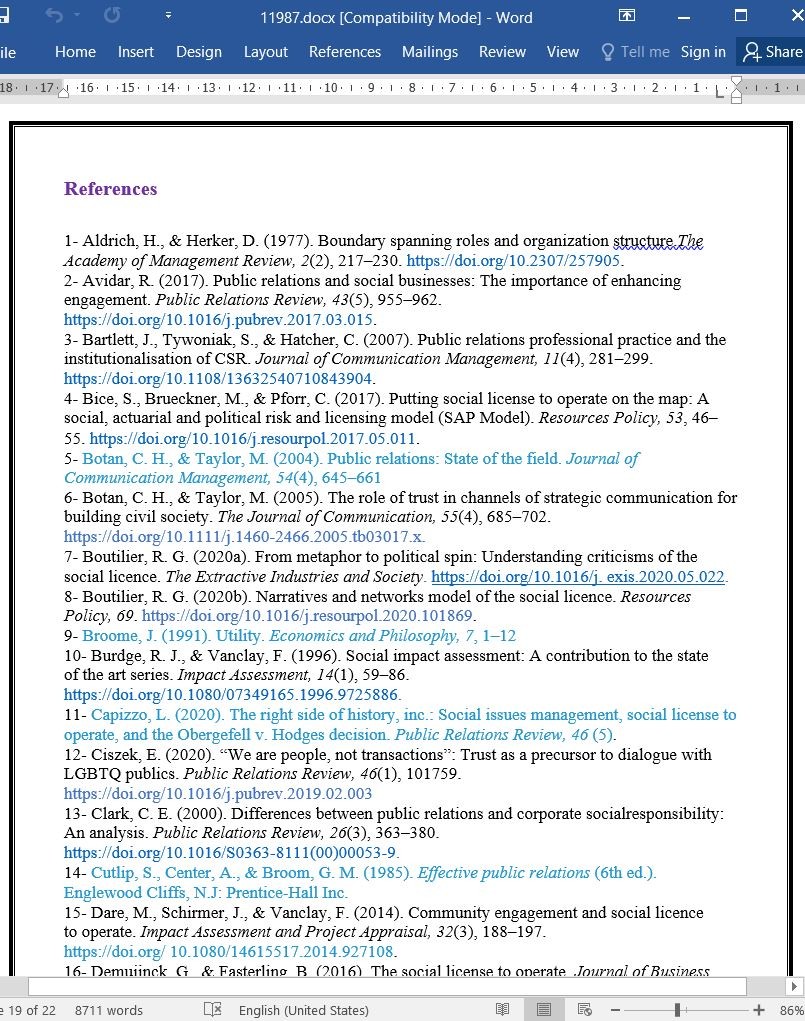
الزام اجتماعی در روابط عمومی: امکانات سودمند تأثیر اجتماعی، مجوز اجتماعی و تعامل
چکیده
روابط عمومی به عنوان یک وظیفه ی محدوده سازمانی شناخته می شود؛ که برای تعامل ارتباطی با ذینفعان مختلف با شیوه هایی که ارتباطات اجتماعی، خلق یا ایجاد مشترک و ارتباطات را تسهیل می کند، مسئولیت دارد. از آنجا که تصمیمات سازمانی تأثیرات خواسته و ناخواسته ای بر جوامع داشته است، این دیدگاه ادعا می کند، که مجوز اجتماعی و تأثیرات اجتماعی برای نظریه روابط عمومی مفید است. این دیدگاه هم چنین بر نیاز سازمان ها برای یافتن راه های بهتر به منظور درک و توجه به انتظارات عمومی به شیوه اصیل تأکید می کند. اعتقاد به این که، یک سازمان یا صنعت دارای مجوز فعالیت اجتماعی است، و نیاز به بررسی تأثیر اجتماعی آنها دارد، هرگز بسیار مهم نبوده است. این بخش ویژه در مروری بر روابط عمومی در حوزه تعامل، مجوز فعالیت اجتماعی(SLO) و تأثیر اجتماعی، به فراخوانی برای بیان سودمندی مجوز اجتماعی (SLO) و تأثیر اجتماعی با تعیین و تقویت مفهومی این مفاهیم در دانش روابط عمومی و ترسیم تحقیقات آینده، برای ایجاد نظریه روابط عمومی پاسخ می دهد. این سرمقاله به طور مفهومی مجوز اجتماعی (SLO) و تأثیر اجتماعی بر روابط عمومی و تعامل را تعیین می کند، و فرصت های تحقیقاتی آینده را مشخص می کند. مقالات این بخش ویژه معرفی می شوند، و پیوندهای بین مفاهیم و روابط عمومی را مشخص می سازند.
1- معرفی
سازمان ها، چه آن را درک کنند و چه نکنند، می توانند از اهمیت تأثیر اجتماعی - مثبت یا منفی - بر جوامعی که در آن فعالیت می کنند، و به طور گسترده تر بر کل جامعه برخوردار باشند. پیش بینی تأثیر اجتماعی سازمان ها - و روابط عمومی - برای پاسخگویی به انتظارات جامعه، لازم و ضروری است (Heath, 2018; Hurst, Johnston, & Lane, 2020; Johnston & Lane, 2018a, 2018b; Taylor, 2011 ). انتظارات اجتماعی منعکس کننده نگرانی های فردی، گروهی و اجتماعی است که که از نظر مفهومی برابر مجوز فعالیت اجتماعی است. با این حال، این انتظارات و در نتیجه مجوزها، شاید همیشه با آنچه از نظر فنی قانونی یا از نظر سیاسی تأیید شده است، مطابقت نداشته باشد (Bice, Brueckner, & Pforr, 2017; Wright & Bice, 2017). موارد جاری و تاریخی که ناهماهنگی بین انتظارات جامعه و اقدامات سازمانی را توصیف می کند، اهمیت تعامل را نشان می دهد. این موارد همچنین نیاز به در نظر گرفتن، ارتباط، تعامل و پاسخ به دیدگاه های متنوعی را که عموماً در یک محیط اجتماعی وجود دارد، به منظور تعیین انتظارات اجتماعی و تأثیر بالقوه (یا واقعی) سازمان یا صنعت، تصدیق می کند.
Abstract
Public relations is recognized as an organizational boundary-spanning function accountable for communication engagement with diverse stakeholders in ways that facilitate social relationships, co-creation, and communication. It is this perspective that underpins the claim that social license and social impact have utility for public relations theory, as organizational decisions have intended and unintended impacts on communities. This perspective also underscores the need for organizations to find better ways to understand and attend to public expectations in an authentic manner. The notion of an organization or industry having a social license to operate and needing to consider their social impact has never been more important. This special section in Public Relations Review on Engagement, Social License to Operate (SLO) and Social Impact responds to the call to articulate the utility of SLO and social impact by situating and conceptually strengthening these concepts within public relations scholarship and outlining future research for public relations theory building. This editorial conceptually situates SLO and social impact for public relations and engagement, and identifies future research opportunities. The papers in this special section are introduced, highlighting the links between the concepts and public relations.
1. Introduction
Organizations, whether they realize it or not, can have a significant social impact – positive or negative – on the communities in which they function, and on society more broadly. Anticipating social impact underscores the imperative for organizations - and public relations - to be responsive to societal expectations (Heath, 2018; Hurst, Johnston, & Lane, 2020; Johnston & Lane, 2018a, 2018b; Taylor, 2011). Societal expectations reflect individual, group, and community concerns, that work to conceptually parallel social license to operate. Yet these expectations and therefore social license/s, may not always align with what is technically lawful or politically endorsed (Bice, Brueckner, & Pforr, 2017; Wright & Bice, 2017). Current and historical cases describing misalignments between community expectation and organizational actions underscore the importance of engagement. These cases also acknowledge the need to consider, communicate, interact with, and respond to diverse perspectives that generally exist in a social environment in order to determine societal expectations and the potential (or actual) impact of the organization or industry.
چکیده
1- معرفی
2- تأثیر اجتماعی
3- مجوز فعالیت اجتماعی
4- ارزش چشم انداز زیست محیطی
5- پیشبرد تأثیر اجتماعی و مجوز فعالیت اجتماعی (SLO) به عنوان دستور کار تحقیق برای روابط عمومی
5-1- مقالات بخش ویژه
6- نقشه راه برای تحقیقات آینده
7- نتیجه گیری
منابع
Abstract
1. Introduction
2. Social impact
3. Social license to operate
4. The value of the ecological perspective
5. Advancing social impact and SLO as a research agenda for public relations
5.1. Special section papers
6. A roadmap for future research
7. Conclusion
References
- ترجمه فارسی مقاله با فرمت ورد (word) با قابلیت ویرایش، بدون آرم سایت ای ترجمه
- ترجمه فارسی مقاله با فرمت pdf، بدون آرم سایت ای ترجمه


